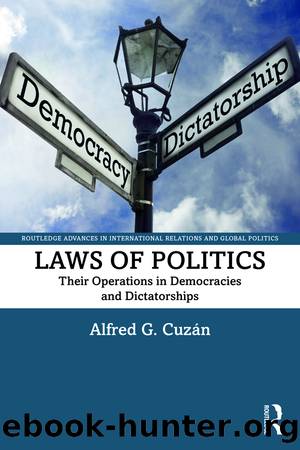Laws of Politics: Their Operations in Democracies and Dictatorships by Alfred G. Cuzán

Author:Alfred G. Cuzán [Cuzán, Alfred G.]
Language: eng
Format: epub
Tags: Political Science, General
ISBN: 9781000423549
Google: GA43EAAAQBAJ
Publisher: Routledge
Published: 2021-08-23T10:36:06+00:00
Pardo Llada said that he felt revulsion at Castroâs âsinister plan,â dismissing it as the work of a madman. Years later, he learned that Castroâs insight had been correct. PrÃo, prepared to abandon the office, had instructed the guard not to fire on the multitude if they broke into the grounds of the palace (Pardo Llada 1989, 70â73; my translation).
On July 26, 1953, the day following the carnavales of Santiago de Cuba, the countryâs second largest city at the eastern end of the Island, expecting the soldiers to be asleep or drunk, Castro staged a spectacular attack on the nearby Moncada military base. (For the definitive history, see de la Cova 2007.) The mission was suicidal: more than half of the 130 attackers, poorly trained and armed, paid with their lives, many summarily executed after surrendering. It was a macabre baptism in blood for what Castro named the 26th of July Movement. He had minimized the personal risk to himself: Without firing a shot, shortly after the attack began he directed the driver of the car in which he was riding to drive away. A squad of soldiers searching for him in the surrounding countryside found him hiding inside a peasantâs hut. His estranged wife, Mirta DÃaz Balart, a sister of one of Batistaâs ministers, asked Havanaâs archbishop to intercede on Castroâs behalf. Taken prisoner and put on trial, he was convicted and sentenced to 15 years in prison (Quirk 1993, 54â59).
In 1955, Batista, newly inaugurated to a four-year term after holding an âelectionâ the outcome of which was never in doubt (prompting the inveterate former president Grau, once again re-nominated by the Auténticos, to pull out of the contest), sent a bill to congress to grant amnesty to the Moncada prisoners. Upon his release, Castro, now a celebrity of sorts, lionized by a segment of the press, resumed his public campaign against the dictator. When the government, in retaliation, tightened the screws of censorship, and Castro could not get any leverage with the existing political parties (even the Ortodoxos shunned him), he left the country for Mexico. There he met wealthy Cuban emigrants who introduced him to important personages, including former president Lázaro Cárdenas and the painters Diego Rivera (expelled from the Communist Party for supporting Trotsky) and David Alfaro Siqueiros (a member of the Communist Party). Also in Mexico, Castro recruited men, among them the Argentinian Ernesto âChéâ Guevara, another communist, then adrift, for whom Castro became, after the one with his mother, âthe primary relationship of his lifeâ (Castañeda 1997, 24; my translation). Castro raised money (making two trips to the U.S. for the purpose), purchased weapons, was briefly jailed in Mexico City when these were discovered, and bought a yacht, the Granma, with money donated by the exiled PrÃo. Late the following year, Castro sailed for Cuba, squeezing 82 men, weapons, and munitions aboard the yacht, a vessel designed to carry only 12. The landing was a failure. Most of the expeditionaries were captured or killed, and almost all the weapons and equipment were lost (Quirk 1993, chap 3â4).
Download
This site does not store any files on its server. We only index and link to content provided by other sites. Please contact the content providers to delete copyright contents if any and email us, we'll remove relevant links or contents immediately.
The European Opportunity by Felipe Fernández-Armesto(569)
The European History Highway: A Guide to Internet Resources by Dennis A. Trinkle Scott A. Merriman(535)
Morgan Kaufmann Digital Watermarking and Steganography by Ingemar Cox Matthew Miller Jeffrey Bloom Jessica Fridrich Ton(528)
The Seven Wonders of the Ancient World by Michael Denis Higgins(521)
Hyperculture by Byung-Chul Han(509)
European Security in a Global Context by Thierry Tardy(505)
European Security without the Soviet Union by Stuart Croft Phil Williams(504)
The Routledge companion to Christian ethics by D. Stephen Long Rebekah L. Miles(498)
Get Real with Storytime by Julie Dietzel-Glair & Marianne Crandall Follis(443)
Hudud Al-'Alam 'The Regions of the World' - a Persian Geography 372 A.H. (982 AD) by V. V. Minorsky & C. E. Bosworth(436)
Gorbachev And His Generals by William C. Green(428)
Tibetan Studies in Comparative Perspective by Chih-yu Shih Yu-Wen Chen(427)
Governance, Growth and Global Leadership by Espen Moe(418)
How Languages Are Learned 5th Edition by Patsy M Lightbown;Nina Spada; & Nina Spada(406)
CliffsNotes on Fitzgerald's The Great Gatsby by Kate Maurer(400)
The Oxford History of the World by Fernández-Armesto Felipe;(388)
The Egyptian Economy, 1952-2000 by Khalid Ikram(379)
Oral Poetry and Narratives from Central Arabia: The Poetry of Ad-Dindan : A Bedouin Bard in Southern Najd (Studies in Arabic Literature, Vol 17) (English and Arabic Edition) by P. M. Kupershoek P. Marcel Kurpershoek(365)
The Oxford Handbook of the Incas by Sonia Alconini(364)
